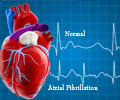For individuals with atrial fibrillation (irregular heart rhythm), the risk of dementia is elevated. AF is already known to be associated with stroke risk.

‘Besides elevated dementia and stroke risk, scientists found that people with atrial fibrillation have silent brain infarcts and small infarcts deeper inside the white matter of the brain, more frequently than others.’





AF is already known to be associated with an increased risk of stroke, and stroke in turn is known to exacerbate dementia risk. However, the connection between AF and dementia with no incidence of stroke has not been established previously. Lina Rydén, who has a PhD in neuropsychiatric epidemiology at Sahlgrenska Academy, University of Gothenburg, based her thesis on data from extensive population surveys known as the Gothenburg H70 Birth Cohort (H70) studies.
Rydén’s research includes data on 70-year-olds examined in 2000, who were then monitored up to age 82 to find out who developed dementia, and on 70-year-olds examined in 2014. Magnetic resonance imaging of the latter group was performed to detect structural changes in the brain.
Several possible causes
“There may be several reasons why the risk of dementia is elevated in people with arial fibrillation, even if they don’t get a stroke. Dementia may be caused by, for example, altered blood flow to the brain; silent brain infarcts, which are lesions in the brain that are visible on brain imaging but don’t cause any typical stroke symptoms; or AF triggering an inflammatory process that raises dementia risk,” Rydén says.
Advertisement
“The fact that AF also causes small infarcts deeper inside the white matter of the brain may mean that AF causes not only stroke and silent infarcts due to blood clots that migrate from the heart and attach themselves to the vessels of the brain, but that other mechanisms resulting in oxygen deficiency can affect the brain in AF. But to understand more specifically how AF affects the brain requires more research,” Rydén says.
Current treatment of AF is aimed primarily at mitigating symptoms and preventing stroke. However, more knowledge is needed about which treatment is best, and when it should be applied, to reduce dementia risk.
“Since there is no curative treatment for dementia today, it’s important to detect and treat risk factors for dementia in the best way to prevent onset of the disease in the first place,” Rydén says.
Title: AF in aging; methodological aspects and the relation to dementia and cerebral vascular disease, http://hdl.handle.net/2077/69811
Source-Eurekalert















